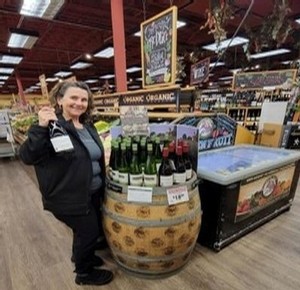Willamette Valley Vineyard “Elves” help tidy up local wine aisles
This December, some Willamette Valley Vineyard volunteers are getting in the holiday spirit by acting as “elves” in the community.
Volunteers team up with members of Willamette’s National Sales Department and visit local stores to stock shelves and displays, tidy up the wine aisle, dust bottles, fill wines in the cold box and more. The program started as a way to support our community partners by providing them with some extra hands during a busy time of year.
Industry Relations Manager Suzanne Shultz said a little help can go a long way during the holidays. She added that many clients have expressed their gratitude for the annual outing.
“We get a lot of responses,” Suzanne said. “There’s a lot of confusion and shock, and they ask if we’re really there just to help them. It’s terrific and a great act of goodwill.”
The volunteers don’t just tidy up our winery’s bottles — they clean up the entire wine section and help customers pick out bottles, too.
Willamette Owners Aurora and Gary Clabaugh said acting as elves is a great way to connect with the community.
Aurora Clabaugh first volunteered as an "elf" in 2022 with her husband Gary.
Gary Clabaugh said making connections is the best part of volunteering.
“It’s a way to volunteer, get out there and meet people,” Gary said. “We can share our experiences with others too.”
Owners looking to volunteer next year can apply through Oregon Wine Enthusiasts or email stock.offering@wvv.com for more information. The elves usually go out on the days before Thanksgiving, Christmas and New Year's Eve.
“It’s nice to try to spread some Christmas cheer and have fun,” Aurora said. She added that it’s great meeting other owners, too.
The yearly tradition is one way Willamette Valley Vineyards aims to positively impact the community.
“It’s about supporting those who are supporting us throughout the year,” Suzanne said. “It’s not much, but it’s a little something we can do to say thank you.”
Fall harvest includes “harvesting” mason bee cocoons to support our native bees
One of the unique ways Willamette Valley Vineyards practices sustainable vineyard stewardship is through our mason bee program. These insects play a crucial role in encouraging biodiversity and maintaining a healthy bee population.
This November, Randy Hillyer, Facilities Coordinator at the winery, and Stephen Paisley, Willamette’s “Bee Guy,” cleaned the mason bee boxes before storing them for the winter. This process included removing nearly 11,000 cocoons from 240 wooden trays and placing the cocoons in a refrigerator so the bees remain dormant until the spring.
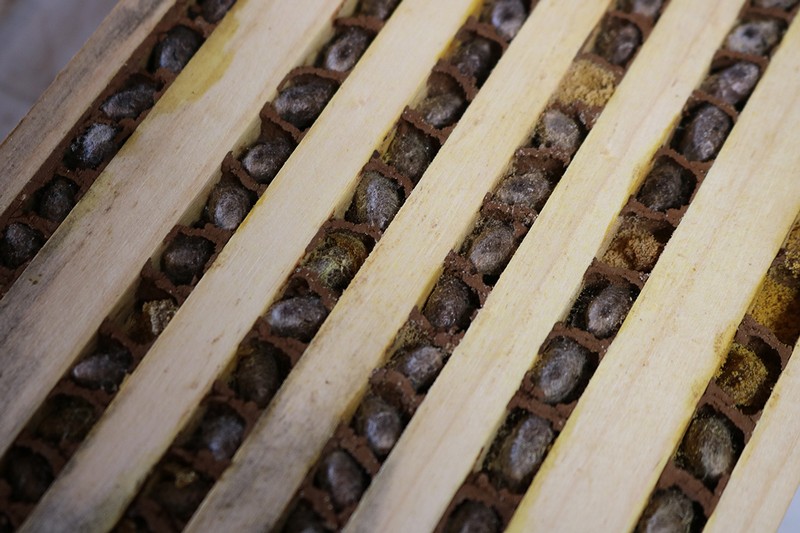
Mason Bee Cocoons
Cleaning the bee box cocoons and trays is crucial to maintaining mason bee populations. Removing pests, mold, pollen, wasps and other materials from the trays ensures the bees have a clean, safe place to live and lay eggs. Washing the cocoons gives the bees a better chance of thriving in the spring.
Stephen and Randy will return the bees to their bee houses in late March or early April. Until then, the bees are hibernating inside their cocoons. As the temperature warms, the bees will emerge and get busy pollinating nearby plants and flowers.
Bees at the vineyard
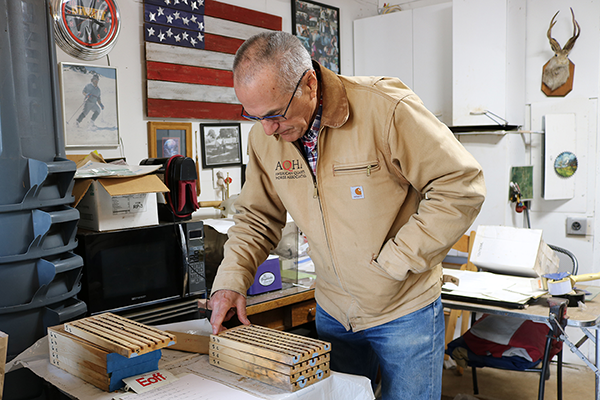
Stephen Paisley, Willamette Valley Vineyards "Bee Guy"
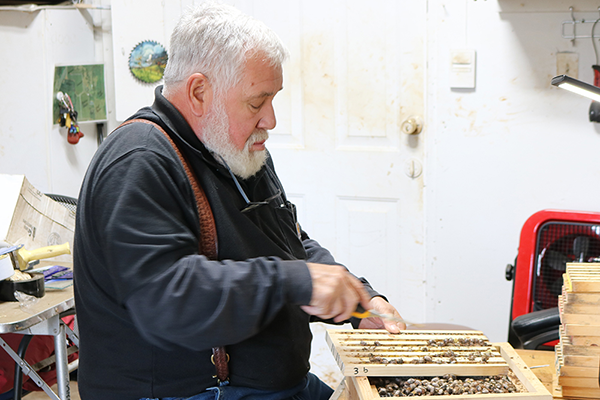
Randy Hillyer, Willamette Valley Vineyards Facilities Coordinator
Since 2019, Stephen and Randy have been working on managing the mason bees and helping bolster pollinator populations.
Willamette first introduced mason bees at four locations in 2019, including Tualatin Estate Vineyard, Elton Vineyard, Bernau Estate Vineyard at Domaine Willamette in the Dundee Hills and the Estate Vineyard in the Salem Hills.
Stephen, a self-described “mason bee enthusiast,” brought the idea to Willamette Valley Vineyards after encountering mason bees for the first time about eight years ago at Jackson Bottom Wetlands in Hillsboro. He was fascinated by the insects.
“What’s really cool about mason bees is they’re native to the valley,” Stephen said, adding that it might surprise some that honey bees are not native pollinators.
About mason bees
Mason bees come in a blueish color and sort of resemble a large fly, Stephen said. This type of bee is known for its efficient and productive pollinating abilities. Unlike honey bees, mason bees are solitary — they don’t live in a hive. They are classified as hole-nesting bees because they build their nests in natural holes they find in their environment or, in this case, man-made holes.
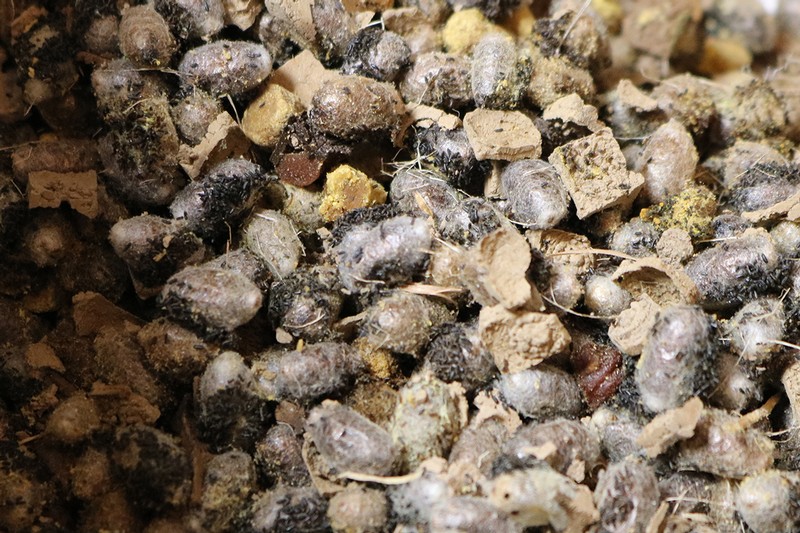
Mason Bee Cocoons
Like other bee species, mason bee populations are declining. Stephen’s idea to reintroduce mason bees into the vineyards is an effort to support healthy populations of native pollinators.
Benefitting the environment
Our vines are self-pollinating, so the bees don’t directly impact our crop. However, bees are a crucial part of our everyday lives.
Mason bees are extremely efficient pollinators, making them a key component to farms and gardens everywhere.
“If we lost the pollinators, we’d lose half of our food,” Paisley said.
This spring, wine enthusiasts can take a close-up look at the mason bees in our vineyards when the boxes return and the bees emerge from their cocoons to help the surrounding environment flourish.
Cow Horn Burial at Bernau Estate Vineyard
Vineyard stewards, staff and Owner volunteers gathered at Domaine Willamette today to bury a cache of cow horns filled with manure.
The biodynamic tradition will transform the manure into a nutrient-rich matter that will enrich the vineyard.
In the spring, the team will unearth the horns and mix the resulting matter with rainwater by hand.
Willamette’s biodynamic consultant Jim Fullmer, prepped the team to fill the horns by hand with manure he brought from his biodynamic farm.
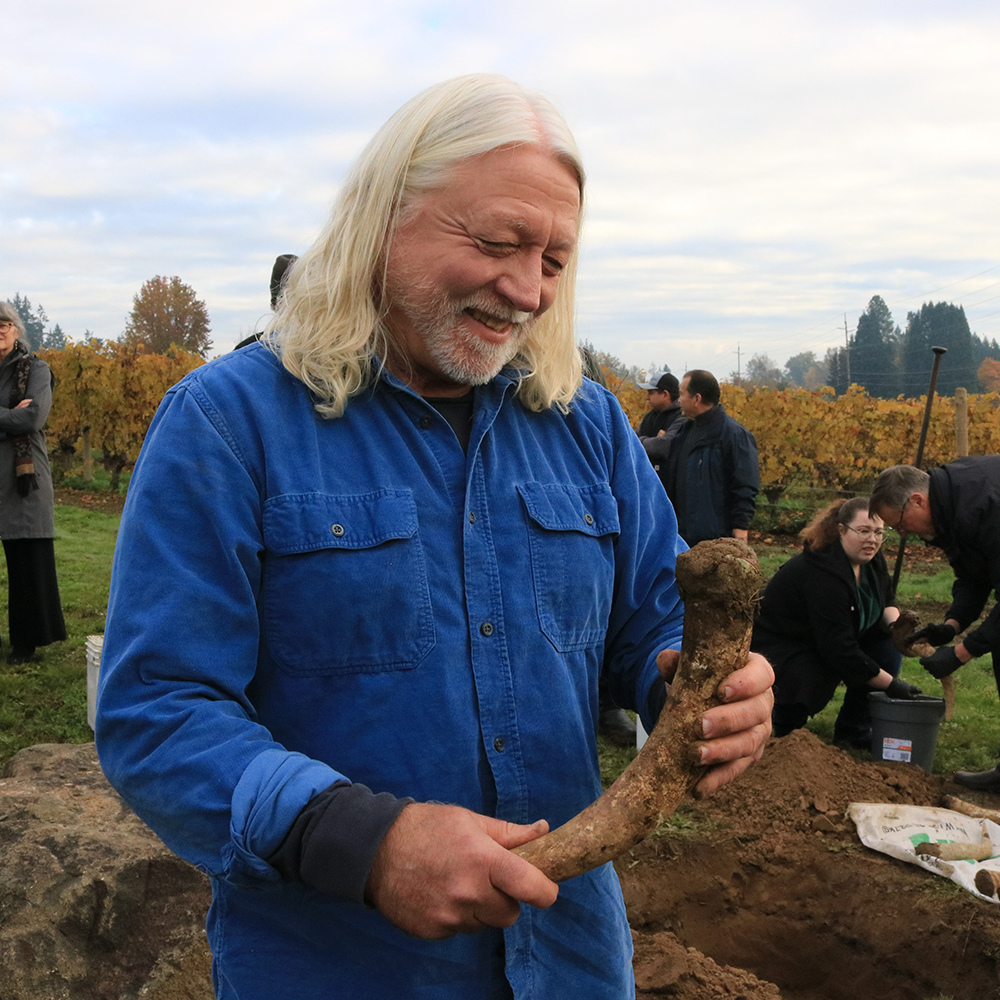
Terry Culton
Director of Winemaking & Vineyards
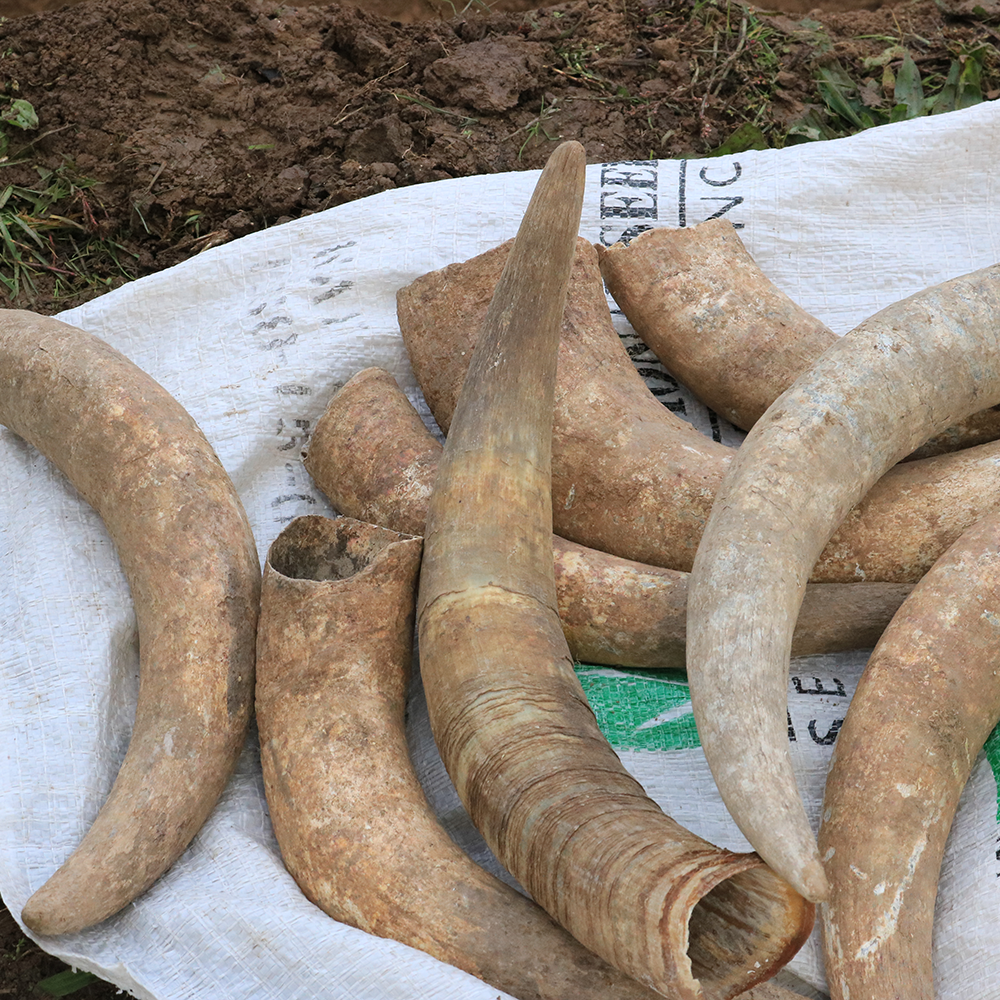
Cow Horns burried at Bernau Estate Vineyards
The manure “will go from something you don’t want to put in your face to something you’ll want to smash your face into,” he said. Indeed, by spring the manure will be a rich, dark, earthy matter that smells sweet and is alive with nutrients.
Come spring, the resulting mixture will be sprayed on the ground beneath the vines at Bernau Estate Vineyard. The cow horns buried today will provide the vineyard with several sprays throughout next year’s growing season.
"These biodynamic preparations represent the culmination of a 25-year effort to produce Demeter-certified Pinot Noir from the Dundee Hills AVA," said Founder and CEO Jim Bernau, "and they mark just the beginning of our journey here.”
The 2023 vintage of Pinot Noir from Bernau Estate Vineyard will be the winery's first official biodynamically-certified grown and biodynamically-certified made wine. Grapes harvested at Bernau Estate this fall were fermented separately from the winery’s other wines to preserve their biodynamic qualities.
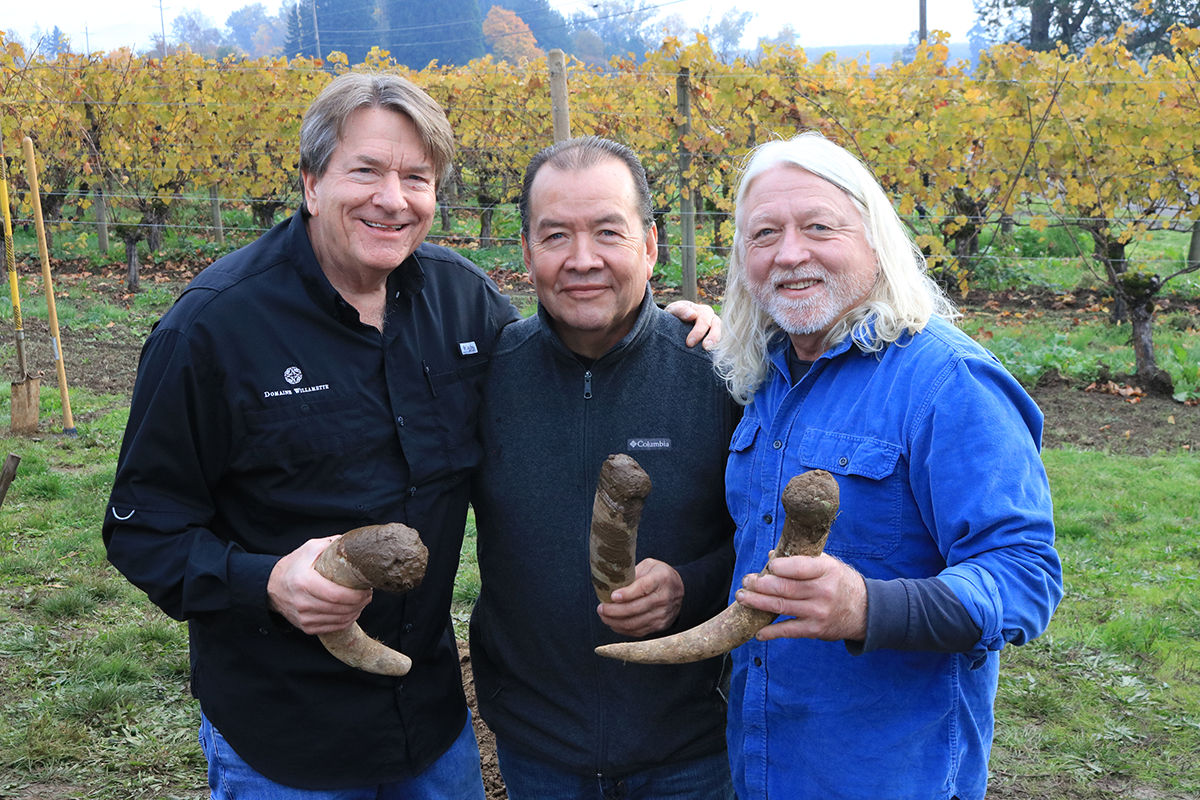
Founder & CEO, Jim Bernau (left), Vineyard Manager, Efren Loeza (center) & Director of Winemaking & Vineyards Terry Culton (right)
Biodynamic farming uses a holistic, ecological and ethical approach in all types of agriculture. It involves managing a farm by treating it like a living organism.
Using biodynamics in the day-to-day operation of a farm, such as a vineyard, encourages a farming system that is minimally dependent on outside materials that can be created to meet the land's needs. These outside materials include chemicals, pesticides and other harmful sprays. The farm's biodiversity is organized in a way that the waste of one part becomes the energy for another, thus increasing the farm's capacity for self-renewal and sustainability.
“It does make good wine,” Fullmer said.
